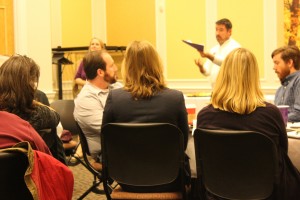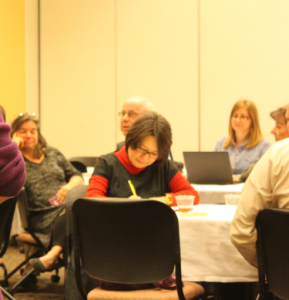Multimedia project created with David Johnson.

WCU faculty and staff listen to Associate Director for the Department of Campus Activities, Mike Corelli, at Nov. 16 Collaborate session. Photo by David Johnson.
Does the “total student experience” consist of having fun stuff to do on the weekends? Is it living in a college environment that provides extracurricular activities that pertain to student interests? Is it simply just receiving all the tools students need to graduate?
Western Carolina University’s faculty and staff attempted to answer these questions and more through Collaborate: A Series of Campus Conversations.
Collaborate is a way for WCU staff to come together and share ideas on how to enhance the lives of everyone at WCU. Collaborate is a key piece of WCU’s 2020 Plan, a proposal that was endorsed in 2012, with the goals of improving community development, scholarships, campus diversity, and learning opportunities.
The total student experience is one of the more uncertain focuses the 2020 Plan and Collaborate attempt to tackle.
The second round of the Collaborate conversations was held on Nov. 16 in Blue Ridge, where around 24 faculty members and one student discussed what the total student experience really is and how to improve it.
Director of Advising at WCU, Travis Bulluck, thinks understanding the definition of the total student experience is the first challenge when trying to enhance it.
“There’s also a challenge in coming up with a uniform approach to encompassing all the different areas of campus to bring about a positive experience for everyone,” he said.
A few different definitions for a gratifying “total student experience” were reached by the end of the session:
- The total student experience is synonymous to being on a campus that has helpful resources that are easily accessible by everyone.
- The total student experience is finding a community to which you feel you belong.
- The total student experience is being prepared to leave WCU with the skills necessary to go into a career.
Though WCU staff members have their own definitions of the total student experience, students describe a wide variety of properties that make up their total experience at Western, and their own suggestions for how to make it better:
Filmed and edited by David Johnson, narrated by Shelby LeQuire
In addition to concerns about academic advising, students expressed varied opinions on diversity on campus, and event opportunities. Not shown in this video, some students also showed distress over the limited parking on campus, and the lack of school spirit at WCU. While there are many concerns, based on the majority of student interviews, the total experience on campus is mostly positive. Events like Homecoming 2015, concerts and student organizations make student experiences memorable.
As demonstrated above, individual student experiences that make up the total experience can be all over the place, and that leaves a lot of ground to cover.
Among the many matters brought up during the Nov. 16 Collaborate conversation, a hot topic was embracing WCU’s current collegiate culture, which is admittedly much different than the culture most of WCU’s faculty experienced in college.
Nate Kreuter, Director of Writing, Rhetoric, and Critical Studies and assistant professor of English, explains it this way: “As people who work at Western, we want what’s best for the students, but in some ways we don’t always understand that the world has changed since we were students at college,” he said. “When we try to perpetually guess at what students need or what students want, we are always going to be behind or just wrong.”
The abundance of technology used today is one reason why the current college generation is so different. Adapting to that culture can be difficult, said several present staff members. A common mistake that professors make is assuming that they cannot keep up with the technology, when in fact, it is not as hard as they fear.
Other concepts discussed included providing adequate opportunities for community involvement to all students, and ensuring that students are truly ready to graduate in four years through supportive advising efforts.

WCU Faculty and staff present at Nov. 16’s Collaborate conversation try to come up with responses to the discussion’s tough questions. Photo by David Johnson.
Associate Director for the Department of Campus Activities, Mike Corelli, believes bringing faculty together to discuss these topics is so important. He was a discussion leader at the Collaborate conversation. “By continuing to hold these sessions, we will continue to improve,” he said.
Corelli added that Collaborate sessions for students will be available soon. He thinks involving students will bring improvement to a whole new level.
In only two hours, a multitude of themes were debated as the staff became familiarized with each other and each other’s concerns and ideas. Some faculty members considered it a useful exercise.
“It is always helpful to get the perspective of others on campus. Some of us have tunnel vision concerning our own departments, so it’s nice to get an angle from other people,” said Bulluck.
Kreuter believes these types of sessions are helpful, but they can also be tricky. There was much confusion at the beginning of the conversation over defining the total student experience, and that created a set-back for the entire session.
“If we don’t define our terms from the beginning, we are potentially having completely separate conversations, and I’m afraid that might have happened here,” Kreuter said.
Despite the confusion, there are some valuable takeaways from Collaborate.
“What I think is great about the session is that people who never get to see each other, because we work in different departments, get to share our thoughts with one another,” said Kreuter. “It’s clear that everyone here really, really cares about the university and the students. I care a whole lot, and I think people willing to come out here, at a time when we would all be going home from work, is a testament to the fact that we care. We are interested in struggling with the tough questions.”
Individual Collaborate sessions focus on four specific topics: enhancing diversity, supporting scholarships, investing in the people, and the total student experience. WCU faculty can register online to attend the conversations, and many decide to attend several of the sessions.
The first collection of Collaborate conversations for staff were held in September. They were followed by November’s second set of sessions, held the 16 through the 19. According to Jessica Woods, executive assistant in the Office of the Chancellor, the third set of conversations will be held Feb. 29 – March 3, 2016. Individual Collaborate conversations are held from 4 – 5:30. View the full schedule of topics and locations here.
According to their website, by the end of the three sets of Collaborate sessions, the objective is to have compiled plenty of ideas and have had enough debates to confidently develop an upgraded path forward concerning diversity, scholarships, investment of the people, and the total student experience.


